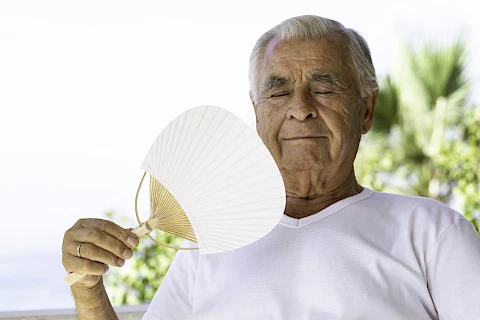
As summer approaches, keeping our seniors safe from the dangers of heat becomes a top priority. Seniors are more susceptible to heat-related issues, and as caregivers, it's important that we stay informed and vigilant. Senior Helpers Greenville will walk you through recognizing signs of heat exhaustion, creating a cool indoor environment, and other best practices to ensure the well-being of your loved ones during the hot summer days.
Recognizing Signs of Heat Exhaustion
Heat exhaustion can quickly become dangerous if not addressed promptly. Here are common symptoms to watch for:
- Heavy sweating
- Weakness or fatigue
- Dizziness or fainting
- Nausea or vomiting
- Rapid pulse
You must learn to differentiate between heat exhaustion and heat stroke. Heat exhaustion can lead to heat stroke, a severe condition that requires immediate medical attention. Heat stroke symptoms include confusion, a body temperature over 103°F, and lack of sweating despite high temperature.
If you notice signs of heat exhaustion, act quickly. Move the seniors to a cool place and give them water to sip slowly. Apply cool, wet cloths to their skin and seek medical attention if symptoms worsen or do not improve.
Creating a Cool Indoor Environment
Air conditioning and fans can significantly improve senior comfort. Make sure AC units are in good working order and use fans to circulate air. Effective ventilation is key. Open windows in the early morning or late evening when it's cooler. Use shades and curtains to block sunlight during the hottest parts of the day to reduce indoor temperatures.
Proper hydration is vital for seniors, especially during hot weather. Seniors may not always recognize when they are thirsty, so encourage regular fluid intake. Offer water frequently throughout the day. Avoid alcoholic and caffeinated beverages as they can lead to dehydration.
Appropriate Clothing and Accessories
Choosing the right clothing can help manage heat effectively. Look for lightweight, breathable fabrics such as cotton or linen. Hats and sunglasses are important accessories for outdoor activities to protect against direct sun exposure. Avoid dark-colored clothing, as it absorbs more heat and can make seniors feel hotter.
Safe Outdoor Activities and Best Practices
If managed correctly, seniors do not need to stay indoors all day. They can engage in outdoor activities during the cooler parts of the day, such as early morning or late evening.
Always seek out shaded areas for outdoor activities. This can include parks with plenty of trees or using a portable canopy. Keep an eye on weather forecasts so you can plan accordingly and avoid excessive heat days.
Besides maintaining a cool environment and hydration, several other steps can enhance safety. Check on seniors regularly, either in person or through phone calls, especially during heat waves. Educate seniors about the risks of heat and the importance of staying cool and hydrated.
We Can Help With Safe Outdoor Practices
Managing heat-related risks for seniors requires attention and proactive measures. Recognize the signs of heat exhaustion and take immediate steps to address it. Create a cool indoor space, ensure regular hydration, select appropriate clothing, and carefully plan any outdoor activities.
For professional senior care services in Simpsonville and Greenville areas, contact us at Senior Helpers Greenville. We are here to help your loved ones stay safe and comfortable all year round.